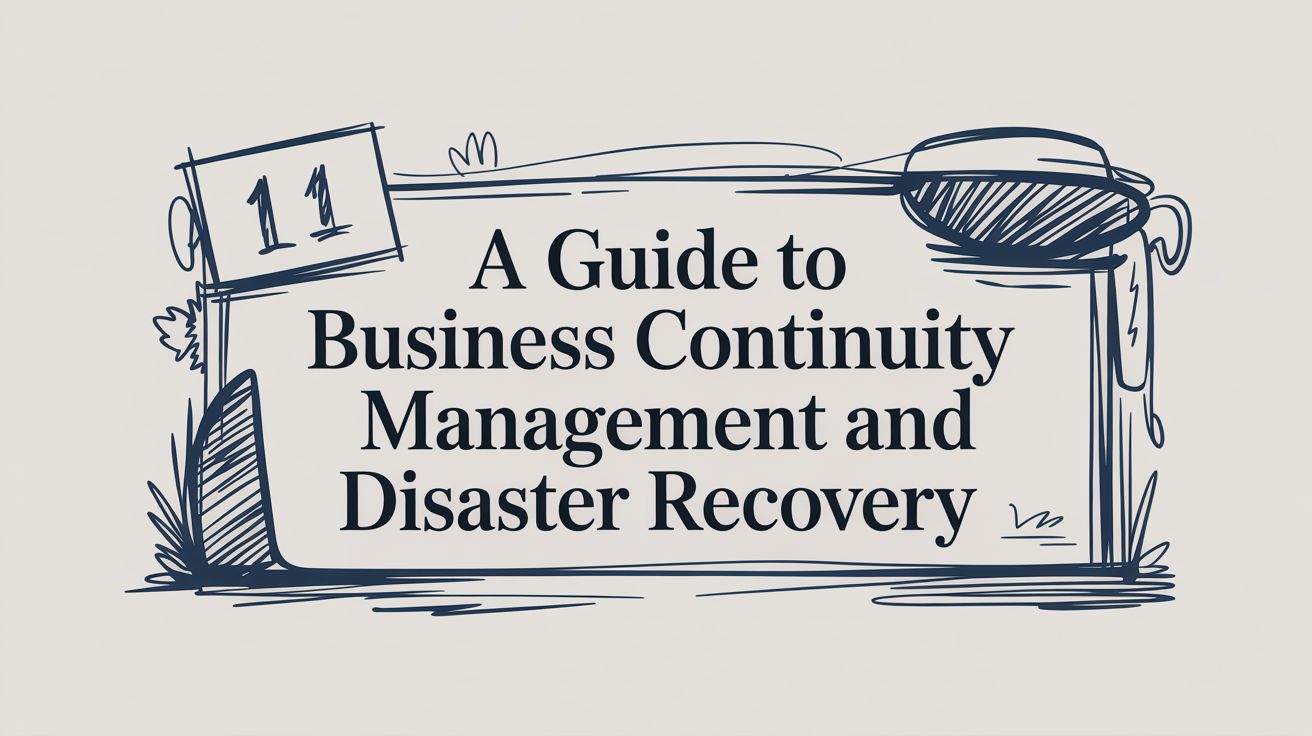
December 22, 2025
A Guide to Business Continuity Management and Disaster RecoveryMaster business continuity management and disaster recovery. Build a resilient plan to protect your Canadian business from any modern disruption.
Read Full PostJuly 29, 2023
-p-500%20(1).webp)
The way businesses use technology is changing, and a big part of this change is the shift towards digital transformation and cloud migration services. This means that businesses are finding new ways to use technology to streamline operations and achieve their goals.
As part of this shift, businesses are adopting digital tools and strategies that help them make their processes more efficient and take advantage of the benefits of cloud computing. Cloud migration services are especially important since they help businesses smoothly move their operations, data, and applications to the cloud.
Imagine your business information and applications stored securely in a virtual storage space that you can access from anywhere, anytime. That's what cloud migration services are all about. It's the process of moving your data, applications, and files from your computers or data centres to the cloud. This technology has many benefits, like cost-effectiveness, flexibility, and strong security measures.
But how can you make this transition smoothly without any problems? The answer is simple: by working with a cloud data services provider.
These providers specialize in helping businesses move their data to the cloud. They have all the tools and techniques needed to transfer your databases, applications, and IT systems. They can assess your needs, plan the migration, transfer the data, test the performance, and provide support after the migration is complete.

In today's fast-changing business world, it's important for companies to keep up with the times and make use of cloud data migration services. Here are a few reasons why businesses need these services.
Cloud services offer scalability that on-premise solutions can't. When your business grows, your technology needs to keep pace. With cloud migration, you can easily scale your IT infrastructure up or down according to your business needs.
Modern cloud platforms incorporate the latest security protocols, protecting your data from cyber threats. Your service provider will implement cloud migration best practices to ensure that your data is secure during transit and at rest in the cloud.
Cloud adoption eliminates the need for expensive hardware and its maintenance. You only pay for what you use, making it a cost-effective solution.
Migrating to the cloud paves the way for modernization. With quick access to cutting-edge technologies, your business can innovate faster, leaving competitors in the digital dust.

For small businesses, cloud migration services offer many benefits. They contribute to cost savings by reducing the need for costly hardware and maintenance. Instead, small firms only pay for what they use. Cloud services also enable easy change of IT infrastructure based on demand. Whether the company is expanding or facing changes, the cloud allows smooth scaling and low disturbance.
Cloud migration boosts efficiency by streamlining operations. Small businesses may automate activities and access data and applications from any location with an internet connection. This feature saves time and increases output.
Cloud migration services can comply with specific needs and budget limitations. The providers understand the challenges faced by small enterprises and offer tailored solutions. They help businesses navigate the migration process and give continuous support to ensure a smooth move to the cloud. Cloud migration for small businesses help them thrive in a competitive climate.

Migrating to the cloud is not an easy feat. But a little help from experts and following cloud migration best practices can go a long way. Here are some practices that you can consider before fully migrating to the cloud.
It's crucial to have a clear migration plan in place. To do this, you must assess your current infrastructure, choose the best provider, and develop a thorough roadmap. Your plan must outline the procedures and timetable for the migration process.
Not all programs are ready for application migration. You must evaluate each program based on its impact on your company's operations, complexity, and dependencies. You can choose the order in which applications migrate by prioritizing them.
Data migration is a vital part of moving to the cloud. It involves transferring your data from your current system to the cloud. Using practical methods like moving data in groups and stages increases the chances of success. These methods ensure your data stays safe and accurate and minimize any issues and downtime.
Security and compliance are of high importance during the cloud migration process. You must install security measures such as access limits and encryption protocols to protect your data. You must also ensure your migration procedure aligns with legal specifications.
Testing and validating your cloud environment is essential before you move your data to the cloud. You must check if everything works, performs well, and meets the needs of your users. These tests give you feedback and allow you to fix any issues before fully transitioning to the cloud.
When migrating to the cloud, you must train your staff and help them adapt to the changes that come with the process. Training ensures employees have the knowledge and skills to work well in the new cloud environment.
Cloud migration is an ongoing process, so it's essential to always look for ways to improve. Regular monitoring allows you to spot problems and adjust to keep your cloud architecture working.

Selecting the best managed service provider (MSP) for your cloud services is critical. Why? Cloud experts act as your trusted navigator, guiding you through the complex journey of moving to the cloud.
The best MSP is a trusted partner who understands your organization. They share your goals and ensure your success.
The MSP should be knowledgeable enough to handle the technical aspects of cloud migration and ensure a smooth transition. They should understand your company's requirements and give tailored solutions that work for you. They should also be able to support your future expansion and provide flexible solutions as your company grows.
You may rely on the skills and direction of a reputable MSP to overcome problems and successfully transition to the cloud. They will be on your side every step of the journey.

In the current digital landscape, the cloud appears to be the go-to resource for most businesses. This is because migration and modernization bring significant growth and success to companies.
Gartner reports that worldwide end-user spending on public cloud data migration services will grow to $597.3 billion in 2023. This growth illustrates the rapidly increasing adoption of cloud services across various industries.
A survey by Rackspace found that 88% of cloud users pointed out cost savings, and 56% agreed that cloud services have helped them boost profits. These figures show the direct impact of cloud migration on business economics.
According to the Cloud Security Alliance, around 64.9% of IT leaders think the cloud is as secure or more secure than on-premises software. This number highlights the improved security features of cloud platforms.

Cloud migration is increasingly popular in various industries. Large companies have embraced cloud technology and successfully improved their operations. Here are some examples:
Netflix used Amazon Web Services (AWS) to handle large amounts of streaming data and deliver a great user experience.
Coca-Cola reduced operational costs by 40% and cut IT help desk tickets by 80% using AWS.
General Electric migrated its workloads and applications to the cloud. This step enhanced its digital capabilities and drove innovation across its business units.
Spotify moved its music services and data processing to the Google Cloud Platform in 2016. Their decision made streaming music more efficient and scalable.
Airbnb ensures a reliable and consistent experience for hosts and guests on its platform by using AWS.

Cloud migration moves your business applications, services, and data from your own servers to a cloud platform like Azure or VMware.
There are different ways to migrate to the cloud. You can move everything as it is (lift and shift) or make changes to optimize your applications for the cloud (refactoring). You can also develop new applications for the cloud (cloud-native).
Cloud migration helps you plan your cloud strategy, modernize your applications, use the right tools for migration, and optimize your cloud environment.
Starting a full cloud migration project involves a detailed process. This process includes cloud migration consulting, using the right tools, choosing between a private or hybrid cloud, and using managed services.
Capturing value in the cloud involves more than switching to a cloud infrastructure. It uses cloud computing capabilities to promote innovation, efficiency, and growth in business. Businesses can uncover new opportunities, improve processes, and remain competitive in a quickly changing digital market with the power of the cloud.
If you're moving to the cloud, CloudOrbis is here to guide your journey. We offer custom cloud migration strategies and solutions that fit your specific needs. Contact CloudOrbis today and start harnessing the power of the cloud.

December 22, 2025
A Guide to Business Continuity Management and Disaster RecoveryMaster business continuity management and disaster recovery. Build a resilient plan to protect your Canadian business from any modern disruption.
Read Full Post
December 21, 2025
Cybersecurity Services for the Alberta Oil & Gas Industry: A Complete GuideDiscover essential cybersecurity services for Alberta oil & gas industry. Protect critical OT/IT systems, secure assets, and ensure operational resilience.
Read Full Post
December 19, 2025
Co-Managed IT Services for the Alberta Oil & Gas Industry: Boost Security & UptimeDiscover how co-managed it services for alberta oil & gas industry can boost security, cut downtime, and optimize field operations.
Read Full Post